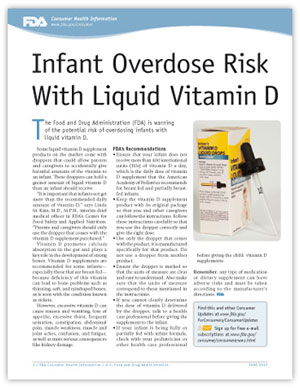Infant Overdose Risk With Liquid Vitamin D
The Food and Drug Administration (FDA) is warning of the potential risk of overdosing infants with liquid vitamin D.
Some liquid vitamin D supplement products on the market come with droppers that could allow parents and caregivers to accidentally give harmful amounts of the vitamin to an infant. These droppers can hold a greater amount of liquid vitamin D than an infant should receive.
"It is important that infants not get more than the recommended daily amount of vitamin D," says Linda M. Katz, M.D., M.P.H., interim chief medical officer in FDA's Center for Food Safety and Applied Nutrition. "Parents and caregivers should only use the dropper that comes with the vitamin D supplement purchased."
Vitamin D promotes calcium absorption in the gut and plays a key role in the development of strong bones. Vitamin D supplements are recommended for some infants—especially those that are breast-fed—because deficiency of this vitamin can lead to bone problems such as thinning, soft, and misshaped bones, as is seen with the condition known as rickets.
However, excessive vitamin D can cause nausea and vomiting, loss of appetite, excessive thirst, frequent urination, constipation, abdominal pain, muscle weakness, muscle and joint aches, confusion, and fatigue, as well as more serious consequences like kidney damage.
FDA's Recommendations
- Ensure that your infant does not receive more than 400 international units (IUs) of vitamin D a day, which is the daily dose of vitamin D supplement that the American Academy of Pediatrics recommends for breast-fed and partially breast-fed infants.
- Keep the vitamin D supplement product with its original package so that you and other caregivers can follow the instructions. Follow these instructions carefully so that you use the dropper correctly and give the right dose.
- Use only the dropper that comes with the product; it is manufactured specifically for that product. Do not use a dropper from another product.
- Ensure the dropper is marked so that the units of measure are clear and easy to understand. Also make sure that the units of measure correspond to those mentioned in the instructions.
- If you cannot clearly determine the dose of vitamin D delivered by the dropper, talk to a health care professional before giving the supplement to the infant.
- If your infant is being fully or partially fed with infant formula, check with your pediatrician or other health care professional before giving the child vitamin D supplements.
Remember: any type of medication or dietary supplement can have adverse effects and must be taken according to the manufacturer's directions.
This article appears on FDA's Consumer Updates page, which features the latest on all FDA-regulated products.
Posted June 15, 2010
Return to FDA Consumer Articles

